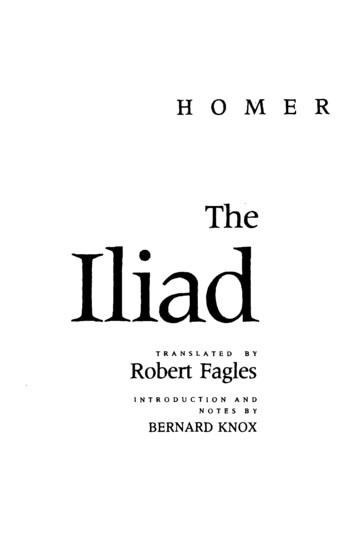
Transcription
H 0MERTheTRANSLATEDBYRobert FaglesINTRODUCTIONANDNOTESBYBERNARD KNOX
PENGUIN@CLASSICSTHE ILIADThe Greeks believed that the Iliad and the Odyssey were composed by asingle poet whom they named Homer. Nothing is known of his life.While seven Greek cities claim the honor of being his birthplace, ancienttradition places him in Ionia, located in the eastern Aegean. His birthdate is undocumented as well, though most modern scholars now placethe composition of the Iliad and the Odyssey in the late eighth or earlyseventh century B.C.ROBERT FAGLES is Arthur W. Marks' 19 Professor of Comparative Literature, Emeritus, at Princeton University. He is the recipient of the 1997PEN/Ralph Manheim Medal for Translation and a 1996 Academy Awardin Literature from the American Academy of Arts and Letters. Fagles hasbeen elected to the Academy, the American Academy of Arts andSciences, and the American Philosophical Society. He has translated thepoems of Bacchylides. His translations of Sophocles' Three Theban Plays,Aeschylus' Oresteia (nominated for a National Book Award) and Homer'sIliad (winner of the 1991 Harold Morton Landon Translation Award byThe Academy of American Poets, an award from The Translation Centerof Columbia University, and the New Jersey Humanities Book Award)are published in Penguin Classics. His original poetry and his translationshave appeared in many journals and reviews, as well as in his book ofpoems, I, Vincent: Poems from the Pictures of Van Gogh. Mr. Fagles was oneof the associate editors of Maynard Mack's Twickenham Edition ofAlexander Pope's Iliad and Odyssey, and, with George Steiner, editedHomer: A Collection of Critical Essays. Mr. Pagles' most recent work is atranslation of Homer's Odyssey, available from Penguin.BERNARD KNOX is Director Emeritus of Harvard's Center for HellenicStudies in Washington, D.C. His essays and reviews have appeared innumerous publications and in 1978 he won the George Jean NathanAward for Dramatic Criticism. His works include Oedipus at Thebes: Sophodes' 'Tragic Hero and His Time; The Heroic Temper: Studies in SophocleanTrageay; Word and Action: Essays on the Ancient Theatre; Essays AncientandModern (awarded the 1989 PEN/Spielvogel-Diamonstein Award); TheOldest Dead White European Males and Other Reflections on the Classics; andBacking into the Future: The Classical 'Tradition and its Renewal. Mr. Knox isthe editor of The Norton Book of Classical Literature, and has also collaborated with Robert Fagles on the Odyssey and The Three Theban Plays.
PENGUINBOOKS
H 0MERTheTRANSLATEDBYRobert FaglesINTRODUCTIONANDNOTESBYBERNARD KNOX
To the memory of my father and my motherand for Lynne, Katya and Nina-humeis gar theai este, pareste te, iste te panta.himeis de kleos oion akouomen oude ti idmen-
TRANSLATOR'SPREFACE"Homer makes us Hearers." Pope has said, "and Virgi/leaves us Readers." So the great translator of Homer, no doubt unknowingly, set atodds the claims of an oral tradition and those of a literary one, as wewould call the two traditions now. Homer's work is a performance. evenin part a musical event. Perhaps that is the source of his speed, directnessand simplicity that Matthew Arnold heard-and his nobility too, elusiveyet undeniable, that Arnold chased but never really caught. Surely it isa major source of Homer's energy, the loft and carry of his imaginationthat sweeps along the listener together with the performer. For there issomething powerful in his song, "that unequal'd Fire and Rapture"Pope again-"which is so forcible in Homer, that no Man of a truePoetical Spirit is Master of himself" while he experiences the Iliad. "InHomer. and in him only, it burns every where clearly, and every whereirresistibly." But it also brings to light the Homeric Question facing alltranslators: How to convey the power of his performance in the mediumof writing? "Homer makes us Hearers, and Virgilleaves us Readers."Yet the contrast may be too extreme. Virgil the writer was certainlyno stranger to recitation. Homer the performer. as the Introductionspeculates. may have known a rudimentary form of writing. And writingmay have lent his work some qualities we associate with texts in general-idiosyncrasies at times. and pungency and wit-and with the Iliadin particular, its archltectonics, its magnificent scale. and the figure ofAchilles. But even if Homer never used an alphabet himself. he nowseems less the creature of an oral tradition whom Milman Parry discovered. and more and more its master. as envisioned by Parry's son,Adam. Homer the brilliant improviser deployed its stock, inherited features with all the individual talent he could muster. Never more so, infact. than in his use of the fixed and formulaic. frequently repeatedphrase. Not only is Homer often less formulaic. but the formulas themselves are often more resonant, more apt and telling in their contextsthan the hard Parryites had argued for at first. So the original form ofHomer's work, while a far cry from a work of literature as we know itnow. is not exactly a song either. pure and simple. It may be more theix
XTRANSLATOR'S PREFACErecord of a song. building over the poet's lifetime perhaps, or whatMarianne Moore would call "a simulacrum of spontaneity."Obviously at a far remove from Homer, in this translation I have triedto find a middle ground (and not a no man's land, if I can help it)between the features of his performance and the expectations of a contemporary reader. Not a line-for-line translation, my version of the Iliadis, I hope, neither so literal in rendering Homer's language as to crampand distort my own-though I want to convey as much of what he saysas possible-nor so literary as to brake his energy, his forward drivethough I want my work to be literate, with any luck. For the moreliteral approach would seem to be too little English, and the moreliteraryseems too little Greek. I have tried to find a cross between the two, amodern English Homer.Of course it is a risky business, stating what one has tried to do or,worse, the principles one has used (petards that will probably hoist thewriter later). But a word or two of explanation seems in order, and thefirst refers to the more fixed and formulaic pans of Homer. I have treatedthem in a flexible, discretionary way, not incompatible with Homer'sway, I think-especially when his formulas are functional as well asfixed-while also answering to the ways we read today. It is a matterof "riding easy in the harness," as Robert Frost once said of democracy.and my practice ranges from the pliant to the strict. With one of themost frequently repeated phrases, for example-the line that introducesindividual speeches-I have been the freest. trying to anticipate thespeaker's nuance of the moment yet retaining, at least. the ritual ofintroductory words for every speech. When Homer introduces a speechof "winged words," however, I rarely if ever omit that well-knownphrase, though I like the flight of the words to vary, with a quick burstat times and a longer drift at others, according to what a character hasto say. And so with Hector's flashing helmet, in the epithet that clingsto Hector's name: I like to ally its gleaming with his actions, now noddinghis head in conversation, now rushing headlong into the front lines.But a flashing helmet it is, again and again, and not only to make hisown career appear more meteoric and abruptly snuffed out but also tosupport a chain of tragic ironies throughout the poem. For the flashinghelmet-Hector's own at first-is soon replaced by the one he stripsfrom Patroclus when he kills him: the helmet of Achilles. So as prophecywould have it. when Achilles destroys Hector in revenge he must destroyhimself as well, his flashing mirror-image embodied in his Victim. andthe helmet he will wear. fire-new and forged by Hephaestus, flasheslike the helmet of Ares when Achilles .closes for the kill (Book 20.45,
TRANSLATOR'S PREFACExi22.158)" The more the epithet recurs, in short, the more its power canrecoil. And the inevitability of its recoil for Hector is further stressed bya repeated passage in the Greek repeated verbatim in the English version.The words that describe the death of Patroclus are exactly those thatdescribe the death of Hector six books later (16.1001-5, 22.425-29):the first death, both in the mind of Achilles the avenger and in the styleof his maker, will have served as warrant for the second. All in all, then,I have tried for repetition with a difference when variation seems useful.repetition with a grim insistence when the scales of Zeus, the Homericmoral balance, is at issue.Turning briefly to Homer's metrics: though my way is more remote,it is also meant to occupy a flexible middle ground, here between hishexameter line-his "ear, ear for the sea-surge," as Pound describes itand a tighter, native English line. If, as the Introduction claims, thestrongest weapon in Homer's poetic arsenal is variety within a metricalnorm, the translation opts for a freer give-and-take between the two,and one that offers a good deal more variety than uniformity. Workingfrom a loose five- or six-beat line but inclining more to six, I expand attimes to seven beats-to imply the big reach of a simile or some vehement outburst in discourse or the pitched fury of combat on the fieldor contract at times to three. to give a point in speech or action sharperstress. Such interplay between variety and norm results. I suppose. froma kind of tug-of-war peculiar to translation, between trying to encapsulate the meaning of the Greek on the one hand and trying to find acadence for one's English on the other, yet joining hands. if possible,to make a line of verse. I hope it results, at any rate, not only in givingmy own language a slight stretching it may need and sometimes getsthese days, but also in lending Homer the sort of range in rhythm, paceand tone that may make an Iliad engaging to a modern reader. It maybe a way as well, again at a far remove, of trying to suggest the tensionin Homer's metrics, his blend of mass and movement both-so muchongkos yet so much grace and speed.In aiming for these and other objectives in a version of the Iliad, Ihave had many kinds of help. The greatest has come from my collaborator, Bernard Knox, whom I would rather call a comrade. Not onlyhas he written the Introduction and Notes to the translation but he hascommented on my drafts for several years. And when I leaf throughI Here and throughout the volume. except for the list of textual variants on p. 619,line numbers refer to the translation. where the line numbers of the Greek text willbe found at the top of every page.
xiiTRANSLATOR'S PREFACEthose pages now, his commentary seems to ring my typescript socompletely that I might be looking at a worse-for-wear, dog-eared manuscript encircled by a scholiast's remarks. Or is it something of a battlemap as well? The vulnerable lines at the center are shored up by acombat-tested ally, whose squads reinforce the weakest sectors and whodeciphers Homer's order of the day and tells a raw recruit what warthe movements of armies and the sentiments of soldiers-is all about.And more, what tragedy-in this, the first tragedy-really means. InBook 9 of the Iliad old Phoenix calls for a man of words and a man ofaction too. My good fortune has been to work with such a man.Several modem scholars and critics, cited in the bibliography, havehelped as well, and so have several modem translators of the Iliad, inwhole or part. Each has introduced me to a new aspect of the poem,another potential for the present. "For if it is true," as Maynard Mackproposes, "that what we translate from a given work is what, wearingthe spectacles of our time, we see in it, it is also true that we see in itwhat we have the power to translate." So my debts to others are considerable, and here I say my thanks to William Arrowsmith, RobertGraves, Martin Hammond. Richmond Lattimore. Christopher Logue,Paul Mazon, Ennis Reese and E. V. Rieu. A few I have known in person,most I have never met. Yet I suspect we all have known each other ina way, having trekked across the same territory, perhaps having allencountered the nightmare that haunted Pope-"that he was engagedin a long journey," as Joseph Spence reports. "puzzled which way totake, and full of fears" that it would never end . And if you reach theend, the fears may start in earnest. In any event, the translator I haveknown the best is the one to whom I owe the most. Robert Fitzgerald.both for the power of his example and because, at a sensitive moment,he heartened me to "fit on your greaves and swordbelt and face themoil or the melee."Many other friends have come to my side, some by reading, someby listening to me read the work-in-progress, and responding in closedetail with criticism or encouragement or a healthy combination of thetwo. Most encouraging of all, none has asked me, "Why another Iliad?"For each understood. it seems, that if Homer was a performer. then histranslator might aim to be one as well, and that no two performancesof the same work-surely not of a musical composition. so probablynot of a work of language either-will ever be the same. The timbreand tempo of each will be distinct, let alone its deeper resonance. buildand thrust. My thanks, then. to Marilyn Arthur. Paul Auster, SandraBerrnann. Charles Beye. Claudia Brodsky, Beth Brombert, Victor Brom-
TRANSLATOR'S PREFACExiiibert, Clarence Brown, Rebecca Bushnell, Robert Connor, Robert F. Goheen, Rachel Hadas, Robert Hollander, Samuel Hynes, Edmund Keeley,Nita Krevans, Janet Lernbke. David Lenson, William Levitan, HerbertMarks, J. D. McClatchy, Earl Miner, William Mullen, Georgia Nugent,Joyce Carol Dates, Joanna Prins, Michael Putnam, David Quint, RichardReid, James Richardson. Charles Segal, Steven Shankman, MichaelSimpson. Raymond Smith, Paolo Vivante and Theodore Weiss.And several classicists have lent a steady hand: William A. Childs,George Dunkel, Elaine Fantham, Andrew Ford, John Keaney, RichardMartin, Glenn Most and Froma Zeitlin. The published commentaries ofother scholars, cited among the further readings, and even some unpublished have helped us on our way, thanks to the kindness and alacrity oftheir authors. Our book was in its later stages when M. M. Willcock sentthe galleys of his second volume, Books 13 through 24. And the remaining parts of the commentary-in-progress under G. S. Kirk's editors hiphis own work on Books 5 through 8, J. B. Hainsworth's on 9 through 12,Richard Janko's on 13 through 16, Mark W. Edwards' on 17 through 20and Nicholas Richardson's on 21 through 24--luckily arrived while eachwas still in proof or typescript. The first impulse for the translation,however, came from the late W. B. Stanford, who, one afternoon inCounty Wicklow many years ago, sketched out my route for returning tothe source.The roofs of some great houses have extended welcome shelter tothe translator and his work. Theodore and Mary Cross have turnedNantucket into Ithaca West with their Homeric hospitality. The Rockefeller Foundation provided a resident fellowship at the Villa Serbelloniin Bellagio during May 1985. Princeton University gave me leaves ofabsence in the spring semesters of 1982, 1985 and 1989, and, more important, the chance to study Homer with many students who have beenan education to me. The Program in Hellenic Studies at the universitytwice appointed me to a Stanley J. Seeger Fellowship, first to begin thetranslation on Greek terrain, then to complete it there years later. Thesecretariat of Comparative Literature, from its leader, Carol Szymanski,to Gary Fuchs. to the Quietwriter and lately, the Laser.Iet, have beeninvaluable in helping to prepare the final manuscript. And close to thezero hour Deborah Fryer shared the task of placing the Greek line numbers throughout the text.To produce the book at hand, my editor, Kathryn Court, assisted byCaroline White, has treated the writing and the writer, too, with energy,affection and address. Beena Kamlani's efforts to copy-edit a fairly largeand unruly manuscript have been heroic. Ann Gold, with all her artistry
xivTRANSLATOR'S PREFACEjoined by Amy Hill's, has designed a volume to companion the two thatcame before it. Anita Karl and lames Kemp have drawn up the finemaps to guide the reader through the wilds of Homer's world. MarySunden has labored long and hard with Joe Marcey and Peter Smith tofind this version of the Iliad some readers. And the good people atViking Penguin-Michael Jacobs. Christine Pevitt, Leigh Butler, PaulSlovak, Marcia Burch, Faye Darnall, Maureen Donnelly, Daniel Lundy,Cynthia Achar, Roni Axelrod-all have been loyal allies in New York. InLondon Peter Carson and Paul Keegan have been generous hosts to thelatest Homer in the house. Before he left the publisher my former editor,Alan Williams, who saw me through the troubles of Aeschylus andSophocles, gave my plans a happy push toward Troy. Prior to the presentvolume, Ben Sonnenberg graciously opened the pages of Grand Streetand ran three books of the translation. Reginald Gibbons gave anotherbook a timely berth in TriQuarterly. And through it all, without the unfailing stay and strategies of my friend and agent Georges Borchardt,assisted by Cindy Klein, this Iliad might never have been published."The Classics, it is the Classics!" Blake exclaimed, with pointed reference to Homer, "that Desolate Europe with W':1rs!" The violence of the Iliad can be overpowering, as it was for Simone Weil and many others,yet, as the Introduction observes, Homer makes that violence coexistwith humanity and compassion, as close together as the city at war andthe city at peace emblazoned on Achilles' shield. If the translation offersany sense of this, it is because the translator has often consulted the familiar spirits of Adam and Anne Parry, and always relied on the Musessummoned in the dedication, chief among them Lynne.R.EPrinceton. New JerseyJune 17, 1990A NOTE ON THIS PRINTING:This printing contains minor revisions of the text.R.E and B.K.June 2001
CONTENTSTranslator's PrefaceixINTRODUCTIONIntroductionThe Spelling and Pronunciation of Homeric Names365MAPS1. Homeric Geography: Mainland Greece2. Homeric Geography: The Peloponnese3. Homeric Geography: The Aegean and Asia MinorInset: Troy and VicinityHOMER:68707272The IliadBOOK1:The Rage of Achilles77BOOK2:The Great Gathering of Armies99BOOK3:Helen Reviews the Champions128BOOK4:The Truce Erupts in War145BOOK5:Diomedes Fights the Gods164BOOK6:Hector Returns to Troy195BOOK7:Ajax Duels with Hector214BOOK8: The Tide of Battle Turns231BOOK9:The Embassy to Achilles251Marauding Through the Night276BOOK 10:xv
xviCONTENTSBOOK11:Agamemnon's Day of Glory296BOOK12:The Trojans Storm the Rampart325BOOK13:Battling for the Ships341BOOK14: Hera Outflanks Zeus369BOOK15: The Achaean Armies at Bay387BOOK16: Patroclus Fights and Dies412BOOK17: Menelaus' Finest Hour442BOOK18: The Shield of Achilles467BOOK19: The Champion Arms for Battle488BOOK20:Olympian Gods in Arms503BOOK21:Achilles Fights the River520BOOK22: The Death of HectorBOOK23:Funeral Games for Patroclus559BOOK24:Achilles and Priam588The Genealogy of the Royal House of Troy617Textual Variants from the Oxford Classical Text619Notes on the Translation621Suggestions for Further Reading635Pronouncing Glossary639541NOTES
INTRODUCTION
INTRODUCTIONTHE ILIAD'Iliad" is a word that means "a poem about Ilium" (i.e., Troy). andHomer's great epic poem has been known as "The Iliad" ever since theGreek historian Herodotus so referred to it in the fifth century a.c. Butthe title is not an adequate description of the contents of the poem,which are best summed up in its opening line: "the rage of Peleus' sonAchilles." The incident that provoked Achilles' rage took place in thetenth and final year of the Achaean attack on Troy. and though Homerdoes work into his narrative scenes that recall earlier stages of the war(the muster of the Achaean forces in Book 2, for example, and Priarn'sfirst sight of Agamemnon and the other Achaean chieftains in Book 3),the rage of Achilles-its cause. its course and its disastrous consequences-is the theme of the poem. the mainspring of the plot.Chryses, a priest of Apollo, whose daughter has been carried olf bythe Achaeans in one of their raids, comes to the camp to ransom her.But she has been assigned, in the division of the booty, to the king whocommands the Achaean army, Agamernnon, and he refuses to give herup. Her father prays for help to Apollo, who sends a plague that devastates the Achaean camp. Achilles, leader of the Myrmidons. one ofthe largest contingents of the Achaean army, summons the chieftainsto an assembly. There they are told by the prophet Calchas that the girlmust be returned to her father. Agamemnon has to give her up, butdemands compensation for his loss. Achilles objects: let Agamemnonwait until more booty is taken. A violent quarrel breaks out betweenthe two men, and Agamemnon finally announces that he will takerecompense for his loss from Achilles. in the form of the girl Briseis.Achilles' share of the booty. Achilles represses an urge to kill Agamemnon and withdraws from the assembly, threatening to leave for home,with all his troops, the next day. The priest's daughter is restored tohim. Apollo puts an end to the plague, and Briseis is taken away fromAchilles' tent by Agamemnon's heralds.Achilles turns to his goddess mother Thetis, asking her to prevail onZeus, father of gods and men. to inflict loss and defeat on the Achaeans.so that they will realize how much they need him. Zeus is won over by3
4HOMERTHE ILIADThetis (10 whom he is indebted for help on a previous occasion), andin spite of the vehement objections of his wife Hera (who, like hisdaughter Athena, hates the Trojans and works for their destruction). heturns the tide of battle against the Achaeans, The Trojan leader Hector,son of Troy's old King Priarn. drives the Achaeans back on their beachedships. round which they are forced to build a wall and ditch. At theurging of his chieftains. Agamemnon sends ambassadors to Achilles,offering him rich prizes and the hand of his daughter in marriage if hewill return to the fighting line. The offer is refused. but the pleas of oneof the ambassadors, Phoenix. an older man who belongs to Achilles'household, do have some effect: Achilles withdraws his threat to leavethe next day; he will stay until Hector and the Trojans reach his ownships.The battle resumes and now the Trojan onslaught breaches the walland threatens the ships. The Achaean chieftains-Agamemnon, hisbrother Menelaus. Diomedes and Odysseus-are wounded one by one.Achilles' closest friend, Patroclus, sent by Achilles to find out how thingsstand in the Achaean camp, brings back the news and also pleads withAchilles to relent. He does so only partly; he agrees to let Patroclus gointo battle with Achilles' troops, wearing Achilles' armor, This is enough:the Trojans in their turn are thrown back. But Patroclus is killed by thegod Apollo, Troy's protector, and by Hector, who strips off Achilles'armor and puts it on himself.Achilles' rage is now directed against Hector, the killer of his dearestfriend. He is reconciled with Agamemnon, and as soon as his motherbrings him a splendid suit of armor, made by the smith-god Hephaestus,he returns to the battle, and after slaughtering many Trojans. meets andkills Hector. He lashes Hector's corpse to his chariot and drags it to hisown tent; he intends to throw it to the dogs and birds of prey. ForPatroclus he holds a magnificent funeral, complete with athletic contestsand human sacrifice. Whenever renewed grief for the loss of his friendovercomes him, he drags Hector's body around Patroclus' grave. Butthe body has been preserved from corruption by divine intervention,and the gods now decide (not unanimously, for Hera and Athena object)to send a message to Achilles through his mother: he is to release Hector'sbody for ransom paid by King Priam of Tray. Achilles agrees, but whathe does not anticipate is the arrival in his tent of Priam himself, alone,in the middle of the night. Instead of sending a herald, he has broughtthe ransom himself and begs for the body of his son. Achilles is remindedof his own father, also an old man who will never see his son again;Achilles knows, for his mother has told him, that his death is to come
INTRODUCTION5soon after Hector's. He sends Priam safely back with Hector's body toTroy and so, runs the last line of the poem, "the Trojans buried Hectorbreaker of horses" (24.944 in the translation). We know already thatthe death of Trov's main defender seals the fate of the city and that, asThetis told Achilles: "hard on the heels of Hector's death your death /must come at once" (18.112-13).This summary is the bare bones of an epic poem that consists in theoriginal Greek of 15,693 lines of hexameter verse, composed-probablyin the late eighth or early seventh century R.c.-by a poet known tolater ages as Homer, for whose life and activity no trustworthy information has come down to us. The poem, in other words, is some 2,700years old. How, the reader may well ask, did it survive through suchan expanse of time? By whom, for whom, and how and in what circumstances was it composed? Perhaps the best way to proceed to anexploration of these questions (no one can promise a complete andcertain answer) is backward-from the text of this book.It is a translation, by Robert Pagles. of the Greek text edited by DavidMonro and Thomas Alien, first published in 1902 by the Oxford University Press. This two-volume edition is printed in a Greek type, complete with lower- and uppercase letters, breathings and accents, whichis based on the elegant handwriting of Richard Porson, an earlynineteenth-century scholar of great brilliance, who was also an incurablealcoholic as well as a great wit. This was of course not the first font ofGreek type; in fact, the first printed edition of Homer, issued in Florencein 1488, was composed in type that imitated contemporary Greek handwriting, with all its complicated ligatures and abbreviations. Early printers tried to make their books look like handwritten manuscripts becausein scholarly circles printed books were regarded as vulgar and inferiorproducts-cheap paperbacks, so to speak.Back to 1488, then, there is a continuous history of the printed textof Homer, differing a little from one editor to another but essentiallyfixed. Before that Homer existed only as a handwritten book. Suchhandwritten copies had been in circulation in Italy for a hundred yearsor so before the first printed edition. Petrarch had tried to learn Greekbut gave up; Boccaccio succeeded and also in 1360 had a chair of Greekfounded in Florence. But before Petrarch, Dante, though he put Homerin his limbo of non-Christian poets, had never read him, and could nothave read him even if he had seen a text. For the best part of a thousandyears, since the end of the Roman Empire, the knowledge of Greek hadbeen lost in Western Europe. In the fourteenth century it was reintro-
6HO,'vIER:THE ILIADduced into Italy from Byzantium. where a Greek-speaking Christianempire had maintained itself ever since Constantine made the city thecapital of the eastern half of the Roman Empire. The knowledge ofGreek and the manuscripts of the Greek classics, Homer included, cameto Italy just in time; in May 1453 Byzantium fell to the Ottoman Turks,and the Greek empire of the East came to the end of its thousand-yearcareer. During its long life it had carefully preserved, copied and recopieda select number of the Greek masterpieces of pre-Christian times, Homerprominent among them. The immediate predecessors of the printededition of Florence were bound manuscript books written on vellum oron paper in a cursive minuscule script complete with accents and breathings. These books were the final phase of the process of copying by handthat went all the way back to the ancient world. In the ninth centurythe new minuscule handwriting had been adopted; since it separatedwords, it was easier to read than its predecessor. a hand consisting offreestanding capital letters without word division-the standard writingof the ancient world. In the second to fifth centuries A.D., the form andmaterial of the books had changed: parchment with its longer life hadreplaced papyrus, and the codex form, our book form-folded quires ofpaper sewn at the back-had replaced the roll. In the ancient world theIliad consisted of a number of papyrus rolls, the text written in columnson the inside surface. The rolls could not be too big (or they wouldbreak when opened for reading); a long poem like the Iliad might requireas many as twenty-four-in fact it is possible the so-called books of ourtext represent an original division into papyrus rolls.In this form the poem was known to the scholars who edited it andwrote commentaries on it in Alexandria, the city founded by Alexanderbefore he set out on his epic march to India in the late fourth centuryB.C. And it was in this form (though, before the Alexandrian scholarsmade a standard edition, with many variations from one text to another)that copies were to be found all over the Greek world of the fourth andfifth centuries s.c. There must have been texts in circulation in the sixthcentury too, for we hear of official recitations at Athens and find echoesof Homer in sixth-century poets. In the seventh century a.c. we aremoving back into the dark. In the poets of this century (whose worksurvives only in fragments) there are epithets, phrases and even halflines that are also common in Homer. Though these poets-Tyrtaeus,Callinus. Alcman and Archilochus-may be using tags common to ageneral epic tradition, it seems more likely that these echoes betrayacquaintance with the work we know as Homer's. There is also a vase,discovered on the island of Ischia, off the coast of Naples
the composition of the Iliad and the Odyssey in the late eighth or early seventh century B.C. ROBERT FAGLES is Arthur W. Marks'19 Professor of Comparative Litera ture, Emeritus, at Princeton University. He is the recipient of the 1997 PEN/Ral











